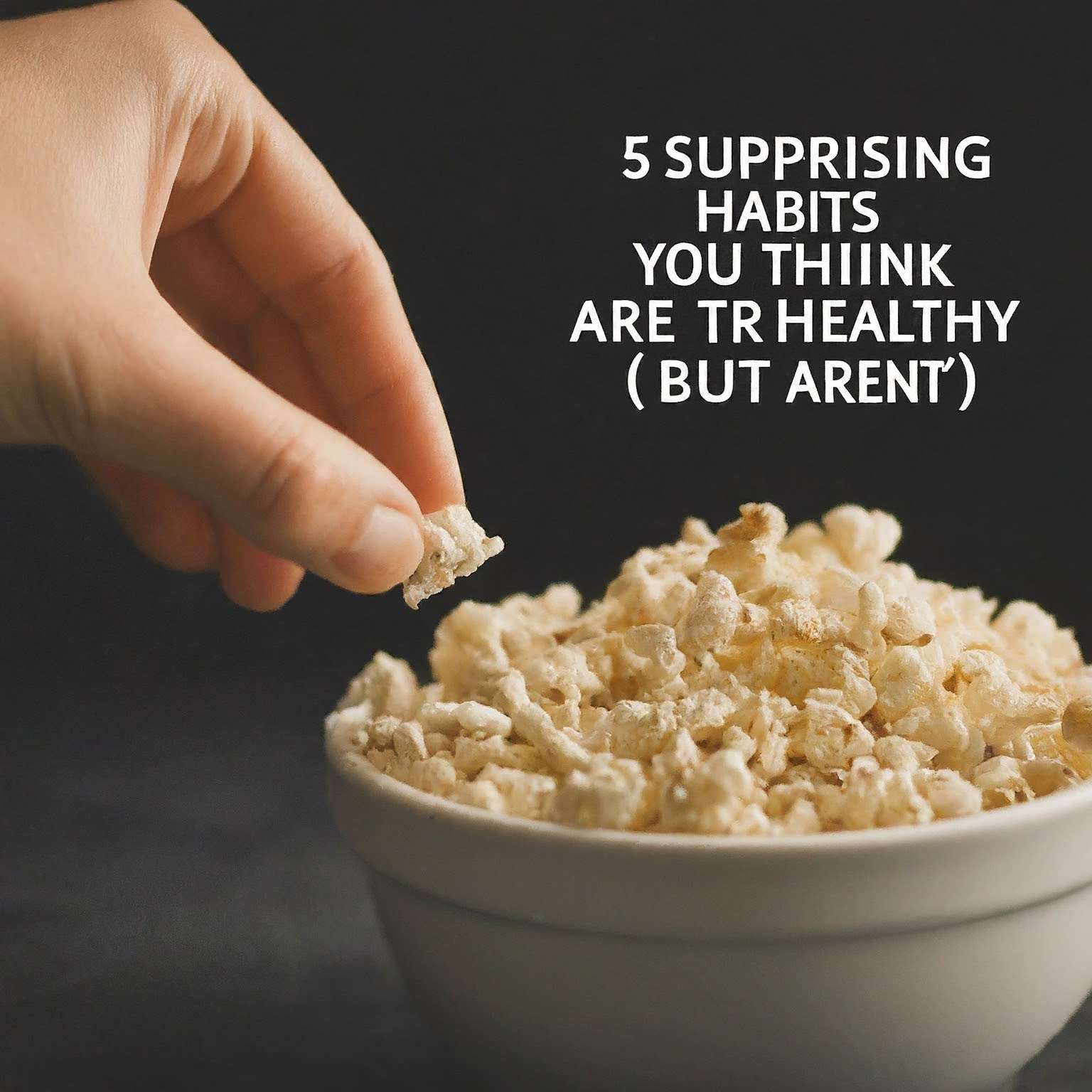You may think that you are leading a healthy lifestyle, but some of your daily habits could be secretly sabotaging your well-being. From skipping breakfast to scrolling through your phone before bed, these seemingly harmless habits can have a negative impact on your physical and mental health. In this post, we will reveal five surprising habits that are harming your health and how you can fix them with simple changes.
Habit 1: Skipping Breakfast
You may have heard that breakfast is the most important meal of the day, but do you know why? Breakfast provides your body and brain with the energy and nutrients they need to function optimally throughout the day. Skipping breakfast can lead to several health problems, such as:
- Increased risk of obesity, diabetes, and heart disease. Studies have shown that people who skip breakfast tend to consume more calories, fat, and sugar later in the day, which can contribute to weight gain and metabolic disorders .
- Impaired cognitive performance and mood. Research has found that skipping breakfast can negatively affect memory, attention, learning, and mood . This can impair your productivity and performance at work or school, as well as your interpersonal relationships.
- Reduced immunity and digestion. Breakfast helps to boost your immune system and regulate your digestive system. Skipping breakfast can weaken your body’s ability to fight off infections and diseases, and cause gastrointestinal issues such as constipation, bloating, and acid reflux .
Fixing Habit 1: Steps to Take
To break the habit of skipping breakfast, you can try the following steps:
- Plan ahead. Prepare your breakfast the night before or choose easy and quick options that you can grab and go, such as yogurt, fruit, nuts, or oatmeal.
- Set an alarm. Wake up earlier to give yourself enough time to eat breakfast without rushing or skipping it.
- Make it enjoyable. Experiment with different recipes and flavors to find what you like and what suits your dietary needs. You can also eat breakfast with your family, friends, or colleagues to make it more social and fun.
Habit 2: Sitting Too Much
If you spend most of your day sitting at a desk, in a car, or on a couch, you may be putting your health at risk. Sitting too much can have serious consequences for your health, such as:

- Increased risk of chronic diseases. Studies have linked prolonged sitting to a higher risk of obesity, diabetes, cardiovascular disease, and some cancers . This is because sitting reduces your muscle activity, blood circulation, and metabolism, which can affect your blood sugar, blood pressure, and cholesterol levels.
- Reduced muscle and bone strength. Sitting too much can cause your muscles and bones to weaken and deteriorate, especially in your lower body. This can lead to poor posture, back pain, joint problems, and increased risk of falls and fractures .
- Lowered mental well-being. Sitting too much can also affect your mental health, as it can reduce your physical activity, social interaction, and exposure to natural light. This can result in lower mood, higher stress, and increased risk of depression and anxiety .
Fixing Habit 2: Steps to Take
To break the habit of sitting too much, you can try the following steps:
- Move more. Aim to get at least 150 minutes of moderate to vigorous physical activity per week, as recommended by the World Health Organization. You can also incorporate more movement into your daily routine, such as taking the stairs, walking or cycling to work, or doing household chores.
- Stand up. Try to stand up and stretch every 30 minutes or so, or use a standing desk or a stability ball instead of a chair. You can also stand up while talking on the phone, watching TV, or reading a book.
- Break it up. If you have to sit for long periods of time, such as during work or travel, make sure to take frequent breaks and move around. You can also use apps or devices that remind you to stand up and track your activity.
Habit 3: Drinking Too Much Coffee
Coffee is one of the most popular beverages in the world, and many people rely on it to stay alert and energized. However, drinking too much coffee can have some negative effects on your health, such as:

- Increased anxiety and insomnia. Coffee contains caffeine, a stimulant that can boost your mood and alertness, but also increase your heart rate, blood pressure, and stress hormones. This can make you feel jittery, nervous, and restless, and interfere with your sleep quality and quantity .
- Reduced absorption of nutrients. Coffee can also affect your digestion and absorption of some essential nutrients, such as calcium, iron, and magnesium. This can lead to deficiencies and health problems, such as osteoporosis, anemia, and muscle cramps .
- Increased risk of dehydration. Coffee is a diuretic, which means it makes you urinate more frequently and lose more fluids. This can cause dehydration, which can impair your physical and mental performance, and cause headaches, fatigue, and dry skin .
Fixing Habit 3: Steps to Take
To break the habit of drinking too much coffee, you can try the following steps:
- Limit your intake. The Mayo Clinic advises that up to 400 milligrams of caffeine per day is safe for most healthy adults, which is equivalent to about four cups of brewed coffee. However, you may need to adjust your intake depending on your individual sensitivity and health conditions.
- Switch to decaf or alternatives. If you enjoy the taste of coffee, you can opt for decaffeinated coffee, which contains much less caffeine than regular coffee. You can also try other beverages that have less or no caffeine, such as herbal tea, water, or juice.
- Cut down gradually. If you are addicted to caffeine, you may experience withdrawal symptoms such as headaches, irritability, and fatigue if you quit abruptly. To avoid these, you can cut down your coffee consumption gradually, by reducing the amount, frequency, or strength of your coffee.
Habit 4: Smoking
Smoking is one of the most harmful habits for your health, and one of the leading causes of preventable death worldwide. Smoking can damage almost every organ and system in your body, and increase your risk of various diseases, such as:
- Lung cancer and other respiratory diseases. Smoking is the main cause of lung cancer, which is the most common and deadly type of cancer. Smoking can also cause chronic obstructive pulmonary disease (COPD), which is a group of lung diseases that make it hard to breathe.
- Heart disease and stroke. Smoking can also affect your cardiovascular system, by narrowing your blood vessels, raising your blood pressure, and increasing your blood clotting. This can lead to heart disease, heart attack, and stroke, which are the leading causes of death globally .
- Other cancers and diseases. Smoking can also increase your risk of developing other types of cancers, such as mouth, throat, bladder, kidney, and pancreas. Smoking can also cause or worsen other diseases, such as diabetes, osteoporosis, rheumatoid arthritis, and infertility .
Fixing Habit 4: Steps to Take
To break the habit of smoking, you can try the following steps:
- Seek professional help. Quitting smoking can be very challenging, but you don’t have to do it alone. You can seek professional help from your doctor, pharmacist, counselor, or quitline, who can provide you with advice, support, and medication to help you quit .
- Use nicotine replacement therapy or other aids. Nicotine replacement therapy (NRT) can help you reduce your nicotine cravings and withdrawal symptoms, by providing you with a low dose of nicotine through patches, gums, lozenges, inhalers, or sprays. You can also use other aids, such as e-cigarettes, hypnosis, or acupuncture, to help you quit .
- Find your motivation and reward yourself. Quitting smoking can be hard, but it can also be rewarding. You can find your motivation to quit by thinking about the benefits of quitting, such as improving your health, saving money, and protecting your loved ones. You can also reward yourself for your progress, by treating yourself to something you enjoy, such as a movie, a meal, or a gift.
Habit 5: Scrolling Through Your Phone Before Bed
If you are like most people, you probably use your phone for various purposes, such as communication, entertainment, education, and work. However, using your phone before bed can have a negative impact on your health, such as:
- Disrupted sleep cycle. Your phone emits blue light, which can suppress the production of melatonin, the hormone that regulates your sleep cycle. This can make it harder for you to fall asleep and stay asleep and affect your sleep quality and quantity.
- Reduced cognitive performance and mood. Poor sleep can also affect your cognitive performance and mood, as it can impair your memory, attention, learning, and creativity. This can affect your productivity and performance at work or school, as well as your interpersonal relationships and well-being.
- Increased exposure to radiation and blue light. Your phone also emits electromagnetic radiation and blue light, which can have harmful effects on your health. Electromagnetic radiation can cause headaches, dizziness, nausea, and fatigue, and may increase your risk of brain tumors and cancer . Blue light can also damage your eyesight, cause eye strain, and increase your risk of macular degeneration and cataracts .
Fixing Habit 5: Steps to Take
To break the habit of scrolling through your phone before bed, you can try the following steps:
- Set a curfew. Establish a time limit for using your phone before bed, such as an hour or 30 minutes, and stick to it. You can also use apps or settings that block or limit your phone usage after a certain time.
- Turn off notifications and sounds. To avoid distractions and temptations, turn off your phone’s notifications and sounds, or put your phone on silent or airplane mode. You can also place your phone away from your bed or in another room, so you won’t be tempted to check it.
- Engage in relaxing activities. Instead of using your phone, engage in relaxing activities that can help you wind down and prepare for sleep, such as reading a book, listening to soothing music, meditating, or doing some gentle stretches.
Conclusion:
As you can see, some of your daily habits may be harming your health more than you realize. However, you can fix them with simple changes and improve your health and well-being. By breaking these habits, you can enjoy the benefits of a healthier lifestyle, such as:
- Better physical and mental performance and mood.
- Lower risk of chronic diseases and complications.
- Higher quality and quantity of sleep.
- More energy and vitality.
We hope you found this article helpful and informative. If you did, please share it with your friends and family, and leave us a comment below. We would love to hear from you. What are some of the habits that you want to break or change? How do you plan to do it? What are some of the challenges and rewards that you face? Let us know in the comments section below. And remember, your health is your wealth. Take care of it.
